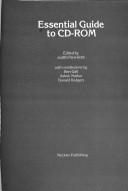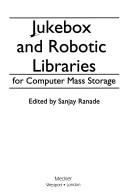| Listing 1 - 7 of 7 |
Sort by
|
Book
ISBN: 9022938034 Year: 1992 Publisher: Utrecht Bruna Informatica
Abstract | Keywords | Export | Availability | Bookmark
 Loading...
Loading...Choose an application
- Reference Manager
- EndNote
- RefWorks (Direct export to RefWorks)
Book
ISBN: 0852672454 0852672462 Year: 1985 Volume: vol 23 Publisher: Hatfield
Abstract | Keywords | Export | Availability | Bookmark
 Loading...
Loading...Choose an application
- Reference Manager
- EndNote
- RefWorks (Direct export to RefWorks)
Library automation --- Compact discs --- Computer storage devices --- Optical storage devices --- Videodiscs --- Discs, Video --- Disks, Video --- Video discs --- Video disks --- Videodisks --- Optical disks --- Video recordings --- Computers --- Laser recording --- Computer memory systems --- Electronic digital computers --- Storage devices, Computer --- Computer input-output equipment --- Memory management (Computer science) --- CDs (Compact discs) --- Compact disks --- Digital compact discs --- Discs, Compact --- Disks, Compact --- Sound recordings --- Optical equipment --- Memory systems --- Storage devices

ISBN: 0887360459 9780887360459 Year: 1986 Publisher: Westport London Meckler
Abstract | Keywords | Export | Availability | Bookmark
 Loading...
Loading...Choose an application
- Reference Manager
- EndNote
- RefWorks (Direct export to RefWorks)
Information systems --- CD-ROM --- Optical storage devices --- Computer storage devices --- CD-ROMs --- Computer storage devices. --- Optical storage devices. --- CD-ROMs. --- CDROMs --- Compact disc read-only memory --- Compact disk read-only memory --- Compact discs --- Optical disks --- Computers --- Laser recording --- Computer memory systems --- Electronic digital computers --- Storage devices, Computer --- Computer input-output equipment --- Memory management (Computer science) --- Optical equipment --- Memory systems --- Storage devices
Book
ISBN: 9780691138619 0691138613 Year: 2009 Publisher: Princeton ; Oxford Princeton University Press
Abstract | Keywords | Export | Availability | Bookmark
 Loading...
Loading...Choose an application
- Reference Manager
- EndNote
- RefWorks (Direct export to RefWorks)
"Delete" looks at the surprising phenomenon of perfect remembering in the digital age, and reveals why we must reintroduce our capacity to forget. Digital technology empowers us as never before, yet it has unforeseen consequences as well. Potentially humiliating content on Facebook is enshrined in cyberspace for future employers to see. Google remembers everything we've searched for and when. The digital realm remembers what is sometimes better forgotten, and this has profound implications for us all. In "Delete", Viktor Mayer-Schonberger traces the important role that forgetting has played throughout human history, from the ability to make sound decisions unencumbered by the past to the possibility of second chances. The written word made it possible for humans to remember across generations and time, yet now digital technology and global networks are overriding our natural ability to forget - the past is ever present, ready to be called up at the click of a mouse. Mayer-Schonberger examines the technology that's facilitating the end of forgetting - digitization, cheap storage and easy retrieval, global access, and increasingly powerful software - and describes the dangers of everlasting digital memory, whether it's outdated information taken out of context or compromising photos the Web won't let us forget. He explains why information privacy rights and other fixes can't help us, and proposes an ingeniously simple solution - expiration dates on information - that may. "Delete" is an eye-opening book that will help us remember how to forget in the digital age.
Information systems --- Theory of knowledge --- Documentation and information --- Memory. --- Computer storage devices. --- Internet --- Persistence. --- Mémoire --- Ordinateurs --- Persévérance --- Social aspects. --- Mémoires --- Aspect social --- Memory --- Computer storage devices --- Persistence --- Social aspects --- 153.125 --- Personality --- Computer memory systems --- Computers --- Electronic digital computers --- Storage devices, Computer --- Computer input-output equipment --- Memory management (Computer science) --- Retention (Psychology) --- Intellect --- Psychology --- Thought and thinking --- Comprehension --- Executive functions (Neuropsychology) --- Mnemonics --- Perseveration (Psychology) --- Reproduction (Psychology) --- DARPA Internet --- Internet (Computer network) --- Wide area networks (Computer networks) --- World Wide Web --- Memory systems --- Storage devices --- Mémoire --- Persévérance --- Mémoires --- Internet - Social aspects

ISBN: 088736571X Year: 1992 Publisher: Westport London Meckler
Abstract | Keywords | Export | Availability | Bookmark
 Loading...
Loading...Choose an application
- Reference Manager
- EndNote
- RefWorks (Direct export to RefWorks)
Computer storage devices --- Computers -- Geheugens --- Moyens d'enregistrement optique --- Optical storage devices --- Optische opslagmedia --- Ordinateurs -- Memoires --- 681.3*B32 --- Computers --- Laser recording --- Computer memory systems --- Electronic digital computers --- Storage devices, Computer --- Computer input-output equipment --- Memory management (Computer science) --- Design styles: associative-, cache-, interleaved memories; primary memory; sequential-access memory; shared memory; virtual memory; mass storage (Memory structures; hardware)--{681.3*D42} --- Optical equipment --- Memory systems --- Storage devices --- 681.3*B32 Design styles: associative-, cache-, interleaved memories; primary memory; sequential-access memory; shared memory; virtual memory; mass storage (Memory structures; hardware)--{681.3*D42}

ISBN: 354055940X 038755940X 3540473157 Year: 1992 Volume: vol 637 Publisher: Berlin : Springer-Verlag,
Abstract | Keywords | Export | Availability | Bookmark
 Loading...
Loading...Choose an application
- Reference Manager
- EndNote
- RefWorks (Direct export to RefWorks)
This is the first book entirely dedicated to the problem of memory management in programming language implementation. Its originality stems from the diversity of languages and approaches presented: functional programming, logic programming, object oriented programming, and parallel and sequential programming. The book contains 29 selected and refereed papers including 3 survey papers, 4 on distributed systems, 4 on parallelism, 4 on functional languages, 3 on logic programming languages, 3 on object oriented languages, 3 on incremental garbage collection, 2 on improving locality, 2 on massively parallel architectures, and an invited paper on the thermodynamics of garbage collection. The book provides a snapshot of the latest research in the domain of memory management for high-level programming language implementations.
Memory management (Computer science) --- -681.3*B3 --- 681.3*D1 --- 681.3*D34 --- 681.3*D4 --- 681.3*E2 --- Management of computer memory --- Computer storage devices --- Loop tiling (Computer science) --- Congresses --- Memory structures (Hardware) --- Programming techniques--See also {681.3*E} --- Processors: code generation; compilers; interpreters; optimization; parsing; preprocessors; run-time environments; translator writing systems and compilergenerators (Programming languages) --- Operating systems--See also {681.3*C} --- Data storage representations: composite structures; contiguous representations; hash-table representations; linked representations; primitive data items --- 681.3*E2 Data storage representations: composite structures; contiguous representations; hash-table representations; linked representations; primitive data items --- 681.3*D4 Operating systems--See also {681.3*C} --- 681.3*D34 Processors: code generation; compilers; interpreters; optimization; parsing; preprocessors; run-time environments; translator writing systems and compilergenerators (Programming languages) --- 681.3*D1 Programming techniques--See also {681.3*E} --- 681.3*B3 Memory structures (Hardware) --- 681.3*B3 --- Memory management (Computer science) - Congresses. --- Computer science. --- Operating systems (Computers). --- Memory management (Computer scie. --- Programming Techniques. --- Computer Engineering. --- Programming Languages, Compilers, Interpreters. --- Operating Systems. --- Memory Structures. --- Data Storage Representation. --- Computer operating systems --- Computers --- Disk operating systems --- Systems software --- Informatics --- Science --- Operating systems
Book
ISBN: 3540645713 3540693521 Year: 1998 Volume: 1417 Publisher: Berlin [etc.] : Springer-Verlag,
Abstract | Keywords | Export | Availability | Bookmark
 Loading...
Loading...Choose an application
- Reference Manager
- EndNote
- RefWorks (Direct export to RefWorks)
This workshop was a continuation of the PCRCW ’94 workshop that focused on issues in parallel communication and routing in support of parallel processing. The workshop series provides a forum for researchers and designers to exchange ideas with respect to challenges and issues in supporting communication for high-performance parallel computing. Within the last few years we have seen the scope of interconnection network technology expand beyond traditional multiprocessor systems to include high-availability clusters and the emerging class of system area networks. New application domains are creating new requirements for interconnection network services, e.g., real-time video, on-line data mining, etc. The emergence of quality-of-service guarantees within these domains challenges existing approaches to interconnection network design. In the recent past we have seen the emphasis on low-latency software layers, the application of multicomputer interconnection technology to distributed shared-memory multiprocessors and LAN interconnects, and the shift toward the use of commodity clusters and standard components. There is a continuing evolution toward powerful and inexpensive network interfaces, and low-cost, high-speed routers and switches from commercial vendors. The goal is to address the above issues in the context of networks of workstations, multicomputers, distributed shared-memory multiprocessors, and traditional tightly-coupled multiprocessor interconnects. The PCRCW ’97 workshop presented 20 regular papers and two short papers covering a range of topics dealing with modern interconnection networks. It was hosted by the Georgia Institute of Technology and sponsored by the Atlanta Chapter of the IEEE Computer Society.
Computer Science --- Engineering & Applied Sciences --- Parallel processing (Electronic computers) --- Computer networks --- Computer science. --- Computer memory systems. --- Microprocessors. --- Computer communication systems. --- Computer system failures. --- Algorithms. --- Computer Science. --- Computer Communication Networks. --- Processor Architectures. --- Memory Structures. --- System Performance and Evaluation. --- Algorithm Analysis and Problem Complexity. --- Congresses --- Memory management (Computer scie. --- Computer system performance. --- Computer software. --- Software, Computer --- Computer systems --- Informatics --- Science --- Algorism --- Algebra --- Arithmetic --- Computer failures --- Computer malfunctions --- Failure of computer systems --- System failures (Engineering) --- Fault-tolerant computing --- Computer memory systems --- Computers --- Electronic digital computers --- Storage devices, Computer --- Computer input-output equipment --- Memory management (Computer science) --- Minicomputers --- Communication systems, Computer --- Computer communication systems --- Data networks, Computer --- ECNs (Electronic communication networks) --- Electronic communication networks --- Networks, Computer --- Teleprocessing networks --- Data transmission systems --- Digital communications --- Electronic systems --- Information networks --- Telecommunication --- Cyberinfrastructure --- Electronic data processing --- Network computers --- Foundations --- Failures --- Memory systems --- Storage devices --- Distributed processing
| Listing 1 - 7 of 7 |
Sort by
|

 Search
Search Feedback
Feedback About
About Help
Help News
News